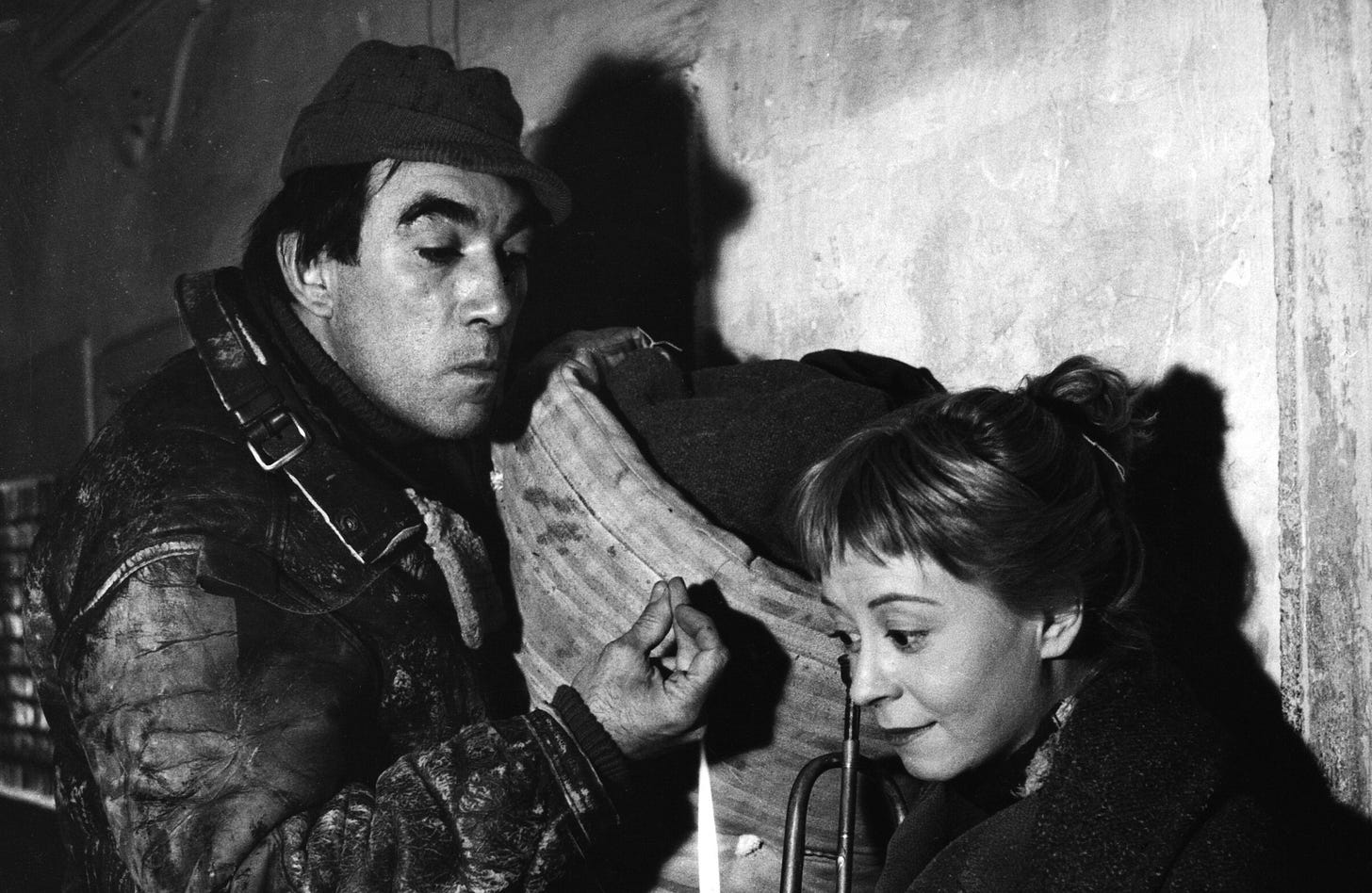On intelligence, part 2
simplicity
Read Part 1.
Set in dreary postwar Italy, Federico Fellini’s La Strada (1954) is the journey of Gelsomina, a young woman sold to a sideshow strongman by her impoverished mother. Forced into marriage to the cruel Zampanò, Gelsomina (Giulietta Masina, Fellini’s frequent collaborator and wife) learns to clown, play the cornet, and pass the hat when her new husband strips down and breaks a giant chain with his pecs. Together, they tour the greyscale countryside in his motorcycle-drawn caravan, hustling change from apathetic crowds.
Zampanò—an electrifying Anthony Quinn—treats sweet Gelsomina very badly, though his violence is occasionally intercut with watchful, if not kind, ministrations. As A.H. Weiler wrote of the “ruthless” strongman for the New York Times, “[Quinn’s] characterization is sensitively developed so that his innate loneliness shows through the chinks of his rough exterior.” Even if the dainty Gelsomina, with Masina’s Chaplinesque face-pulling, wasn’t immediately dear, Zampanò’s monstrosity ought to mire him in one-dimensionality; yet Quinn renders a human sadist, one who cares about Gelsomina, if not for her.
But back to our story. One night, Gelsomina finds herself mesmerized by the Fool (Richard Basehart), a high-wire artist who balances miraculously above a packed city square. When she and Zampanò join up with the Fool’s circus, he goads her master into a fight. With Zampanò in lockup, Gelsomina confesses to the Fool that she wants to run away, maybe with him, but he convinces her not to leave. Bluntly but good-naturedly identifying her general worthlessness—she can’t cook, he explains, and has a face like an artichoke—he suggests that it may be her lot to remain. “Everything serves a purpose,” he says, “even the stones.”
As if in ironic cosmic punishment for his meddling, upon Zampanò’s release, the strongman finishes what he started, killing the Fool. He and Gelsomina go on the run together, finally converging with the tragic fate awaiting her in the snowy alps of the Abruzzos.
La Strada is the same movie today that it was 70 years ago, but compare its reviews over the decades to witness Gelsomina undergo an evolution of sorts. In 1956, Weiler describes Masina’s character as “simpleminded.” In 1993, Martin Scorsese adds to Weiler’s epithet: she is a “simpleminded waif.” In 1994, Roger Ebert boldly diagnoses her as “slow-witted.” In 2002, it’s the noun that is modified: Gelsomina is still a waif, but a “clownish” one. Sometimes the reviewer will sidestep mention of intelligence altogether, which tends to happen more as the reviews creep closer to us in time. In 2015, she is “sweet and naive” (as if intelligence and demeanor are not entirely extricable from one another); in 2021, she is “quiet and eclectic.”
In his 40th anniversary review of La Strada, Ebert refers to the film as a fable, a forgettable inaccuracy. But fable and parable, which to me have always felt interchangeable, are actually distinct. Both are forms of naive allegory that illustrate an instructive lesson or principle, but while parable usually has human characters, fable tells the tales of non-humans. Parable: despite his tribal enmity, a Samaritan stops to tend to the wounds of an injured Jew. Fable: tortoise beats a hare in a footrace.
Not that I miss Ebert’s point. I think, in using fable, he’s trying express La Strada’s profound simplicity, especially in comparison with Fellini’s later films, observing that it “contains many of the obsessive visual trademarks that [Fellini] would return to again and again: the circus, and parades, and a figure suspended between earth and sky, and one woman who is a waif and another who is a carnal monster, and of course the seashore.” Peopled by people and animated by archetypes both personal and general, the parable of La Strada holds a dreamy three-way with itself and history, working and reworking its themes like a taffy puller. Fellini himself called it, “the complete catalogue of my entire mythological world.” Simple, in this context, means essential, or perhaps fundamental. But as we have noticed about the language used to talk about Gelsomina—who, in the non-stigmatizing parlance of today, might be called intellectually disabled—simple can mean other things, too.
Ebert’s flip-flop opened something up for me. Italian neorealist films like La Strada (which, per Ebert, was the “bridge between the postwar Italian neorealism which shaped Fellini, and the fanciful autobiographical extravaganzas which followed”) are characterized as stories about everyday life among the poor and working class in the ruins of World War II and the wake of Italian fascism. They’re honest narratives of quotidian struggle, sacrifice, and the dehumanization of poverty and want. While it was certainly not his intent, Ebert’s inversion beckons us to inspect what it means to be human, and otherwise, a little more closely. The main characters of La Strada are poor, itinerant, and uneducated. Our protagonist, the luminous Gelsomina, is also young woman and, what’s more, a “simple” one; in her short life, she is beaten, raped, trafficked, and abandoned as a matter of course.
And yet. “[Masina] is expert at pantomime, funny as the tow-headed, doe-eyed and trusting foil and sentient enough to portray in wordless tension her fear of the man she basically loves,” writes Weiler. Both Masina and Quinn transcend, their craftspersonship powerful enough to carry us along with them (strongmen both!). This clarity disrupted my instinct to fixate on the cinematic ableism in relation to Gelsomina as a character. As I’ve written before, I grew up watching maudlin “inspiration porn” parading as art, one of the few mainstream genres where contemporary artists and characters with cognitive, intellectual, and developmental disabilities can be found as something other than a punchline. Naive allegory or not, it was invigorating to see what we would now frame as a disabled character of this kind being taken seriously.
For those non-disabled people who can only find it in themselves to infantilize those like Gelsomina, so-called innocence is easily interpreted as virtue. And it’s true that she’s good: though unintelligent, she is smart (and I mean what I say), resourceful, courageous, kind, and strong, for a time creating a real life for herself from the meagerness she’s dealt. But it’s also true that she, like her brutal husband, whose cruelty challenges the very concept of forgiveness, is a person—though, in keeping with Fellini’s allegorical form, of a type that no longer exists, and perhaps never did.
David tweets at @k8bushofficial. Preorder X: A Novel, out on June 28.
Subscribe to support GOOD ADVICE/BAD GAY, an advice series from an anonymous gay therapist who’s not afraid to hurt your feelings with the truth. (Here’s an unlocked post for a taste of what you’re missing.) 100% of funds go to support a rotating selection of mutual aid and reparations projects.
Want advice? Email badgayadvice@gmail.com for a free 3-month subscription.



